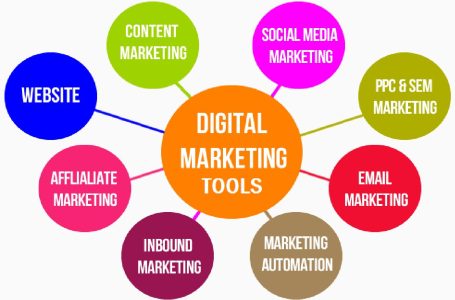Launching a new business is an exciting venture. With the digital age upon us, reaching potential customers and establishing a brand has never been more accessible. However, this accessibility also means increased competition at TonyBet login. To stand out, it’s essential to kick off your digital marketing strategy the right way. Here’s a guide to ensure your new business’s digital marketing success.
OUR RECOMMENDATIONS

1. Understand Your Target Audience:
Before you delve into any marketing campaign, it’s pivotal to understand who your target audience is. Determine their demographics, behaviors, preferences, and the challenges they face. Tools like Google Analytics can offer insights into your website’s visitors, while surveys can provide direct feedback from your audience.
2. Establish Clear Objectives:
To drive a successful campaign, set clear, achievable goals. Whether you want to increase website traffic, drive sales, or raise brand awareness, having a tangible goal helps you tailor your strategy and measure its success.
3. Build a Mobile-Responsive Website:
In today’s digital-first age, a business without a website is like a shop without a signboard. Ensure that your website is mobile-responsive, as more than half of global web traffic comes from mobile devices. Optimize your site for search engines (SEO), as this will improve visibility on platforms like Google.
4. Dive into Content Marketing:
Content is king. Regularly publishing high-quality, relevant, and original content positions your brand as an authority in your field. Whether through blog posts, infographics, or videos, consistent content can drive traffic, enhance SEO, and engage visitors.
5. Embrace Social Media:
Choose the right platforms based on your audience. B2B businesses might flourish on LinkedIn, while B2C businesses could find success on Instagram or TikTok. Be authentic, engage with your followers, and ensure you post consistently.
6. Try Email Marketing:
Despite being one of the oldest digital marketing methods, email marketing offers one of the highest returns on investment (ROI). Collect email addresses ethically and send out regular newsletters or promotional offers. Personalize these emails for better engagement.
7. Pay-Per-Click (PPC) Advertising:
Paid ads can drive immediate traffic and sales. Platforms like Google Ads or Facebook Ads allow you to set a budget and target specific demographics. Monitor and adjust your campaigns for optimal performance.
8. Use Analytics:
Regardless of the platforms you use, monitor your metrics. Tools like Google Analytics or social media insights can show what’s working and what’s not. By understanding these metrics, you can pivot or double down on strategies, ensuring efficient use of resources.
9. Engage with Influencers:
Influencer marketing can be incredibly effective, especially for B2C brands. Engaging with influencers in your industry can help you tap into their audience, expanding your reach organically.
10. Continuous Learning and Adaptation:
Digital marketing is ever-evolving. Keep abreast of the latest trends and tools. Attend webinars, subscribe to digital marketing blogs, or consider taking courses. The more informed you are, the better your strategy will be.
Starting digital marketing for your new business is a blend of art and science. While the above steps provide a blueprint, the real success lies in understanding your unique business needs and audience. Be patient, be consistent, and always be ready to adapt. Remember, digital marketing is not just about selling a product or service; it’s about building relationships with your audience. Start with the right footing, and you’ll pave the way for long-term digital marketing success.
HOW TO DRIVE MORE TRAFFIC FOR YOUR SMALL-SIZED BUSINESS

The digital marketing landscape is constantly evolving, driven by technological advancements and changing consumer behaviors. For small businesses, these shifts often bring both challenges and opportunities. The key lies in staying updated with the latest improvements and leveraging them for effective brand presence.
Paid ads can drive immediate traffic and sales. Platforms like Google Ads or Facebook Ads allow you to set a budget and target specific demographics. Working with a PPC agency can help you monitor and adjust your campaigns for optimal performance.
Here’s a look at some of the latest enhancements in digital marketing technologies tailored for small businesses:
1. AI-Powered Chatbots:
Artificial Intelligence (AI) has taken chatbot interactions to the next level. Today’s chatbots, driven by AI, are capable of simulating almost human-like conversations, answering queries, and solving problems in real-time. For small businesses, they offer the dual advantage of cost-saving (by reducing the need for a 24/7 customer service team) and providing instant support to potential clients or customers.
2. Predictive & Advanced Analytics:
Predictive analytics tools, which once were accessible only to big enterprises due to their cost, are now available for small businesses. These tools utilize data to predict future consumer behavior. By analyzing past data and trends, they provide insights on potential future sales, marketing campaign outcomes, and customer behaviors.
3. Improved Local SEO Tools:
The emphasis on local SEO is growing as consumers increasingly search for local businesses near them. Platforms like Google My Business have enhanced their features, allowing small-sized businesses to optimize their listings, post updates, and engage with customers directly. Enhanced local SEO tools and platforms ensure that small businesses can have a dominant presence in their localities.
4. Voice Search Optimization:
With the rise of smart speakers like Amazon’s Alexa and Google Home, voice search is becoming more prevalent. New tools allow small businesses to optimize their content for voice search, ensuring they don’t miss out on this growing segment of search queries.
5. Visual & Video Search:
Platforms like Pinterest now allow users to search using images. Similarly, Google is continuously improving its video search capabilities. Small businesses can leverage this by optimizing their visual content, making it discoverable through visual and video search tools.
6. Personalized Email Marketing:
Advanced email marketing platforms have emerged, enabling businesses to send hyper-personalized emails. These platforms segment email lists more effectively and automate email sequences based on user behavior, ensuring better engagement and higher conversion rates.
7. Augmented Reality (AR) Experiences:
Though still in the early stages for widespread adoption, AR can be a game-changer for small businesses, especially in retail. AR allows customers to “experience” products before purchasing. For instance, a furniture store might let customers visualize how a sofa looks in their living room through an AR app.
8. Social Commerce Enhancements:
Platforms like Instagram and Facebook have integrated shopping features, transforming them from mere socializing platforms to potent sales channels. Small businesses can now set up shop on these platforms, allowing customers to purchase without ever leaving the app.





